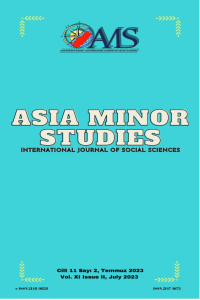İngiltere ve Rusya’nın I. Dünya Savaşı Sırasında ve Sonrasında İran Siyaseti (1914-1925)
The Iranian Politics of Britain and Russia During and After World War I (1914-1925)
Author(s): Yılmaz KaradenizSubject(s): Diplomatic history, Military history, Political history, Pre-WW I & WW I (1900 -1919), Interwar Period (1920 - 1939)
Published by: Kilis 7 Aralık Üniversity
Keywords: Iran; Britain; Russia; World War I;
Summary/Abstract: Iran has attracted the attention of imperialist states due to its strategic location and underground resources throughout history. Since the last half of the 19th century, it has been exposed to the colonial policy of Britain, Russia and France. In particular, at the beginning of the 20th century, Britain, which made its influence felt in Iran, put into action all diplomatic maneuvers so that Russia, which had its targets in the same lands, did not stray from the route of India and did not reach the Persian Gulf. Britain was successful in its policy of keeping Russia busy at the desk and content with Iran's occupation of its northern lands. At the beginning of the Qajar administration, he played a mediator role to prevent the Iranian-Russian Wars, which started with the occupation of the northern lands during the reign of Fethali Shah, from spreading to the south, and as a result of this role, he ensured that Iran was sentenced to heavy war compensation with the Gulistan and Turkmençay agreements signed between the two states. The compensation to be paid to Russia facilitated the establishment of British influence financially, and the fact that the occupied lands remained in Russia stopped this state. Seeing Iran as its own sphere of influence before the First World War, Britain, on the other hand, wore down the Qajar administration and moved towards its goal step by step. Russia, on the other hand, has revealed its expansionist policy on Iran by taking a role in this goal. In our study, we will try to give the occupation of the two colonial countries mentioned in Iran, how the British stockpiled basic foodstuffs during the war caused famine and mass deaths, and the situation that emerged in Iran after the Soviet Union's withdrawal from the war with the socialist revolution. The Soviet Union's Iran policy and Britain's diplomatic moves and the neutralization of this policy will be discussed in the context of frequent government changes in the Qajar administration. We will try to reveal the loss of independence with the Iran-British Agreement signed after the war and why Rıza Mirpençe was brought to power in line with the sources of the period.
Journal: Asia Minor Studies
- Issue Year: 2023
- Issue No: 2
- Page Range: 186-205
- Page Count: 20
- Language: Turkish

